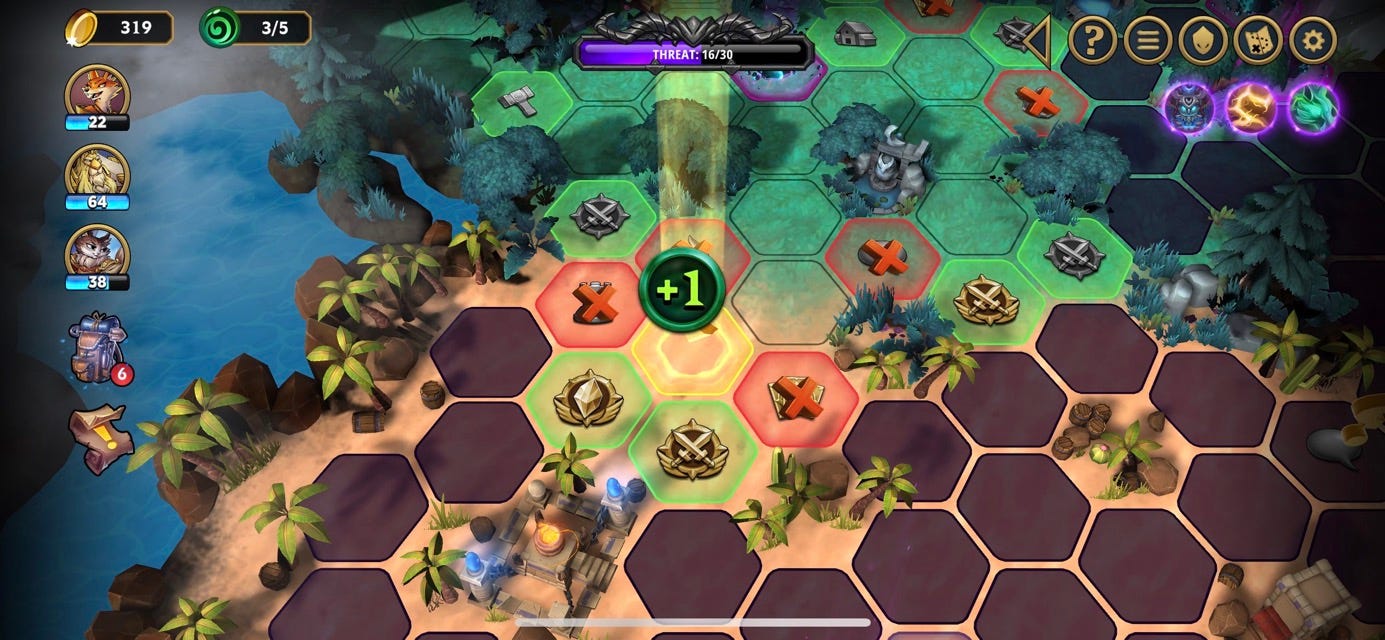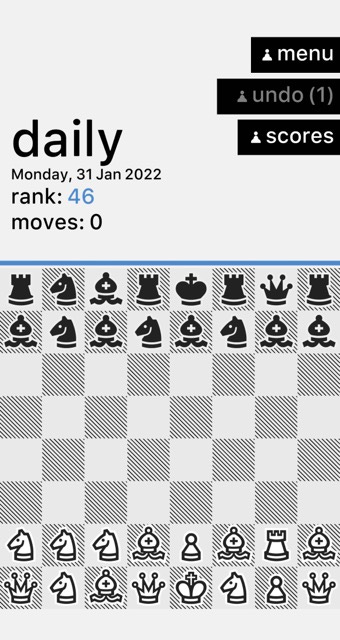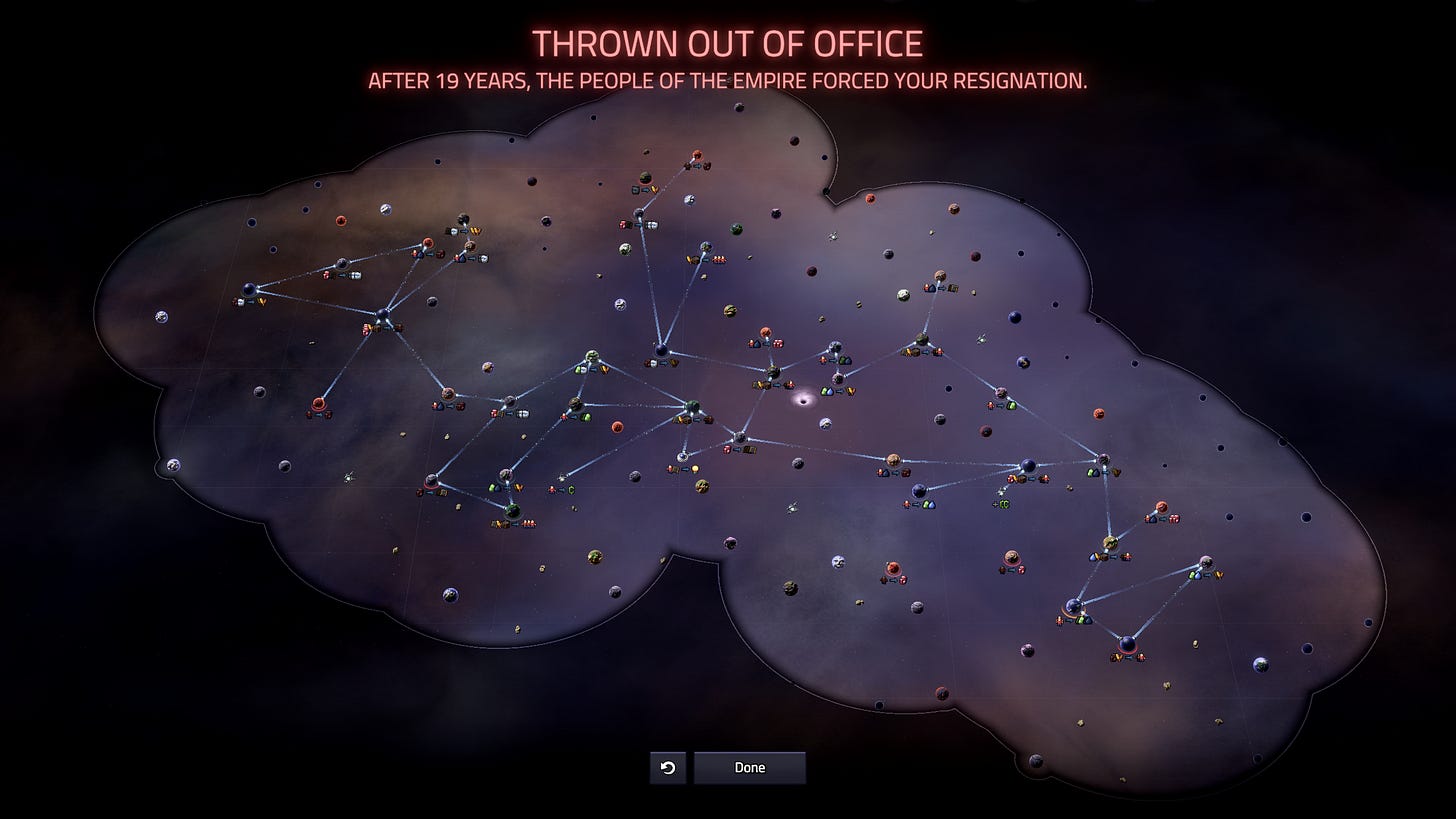Netflix Goes to the Games
Arcanium, let's see if there are more like it?
Netflix's (yes you read that right, Netflix) new title Arcanium: Rise of Akhan is a deckbuilding roguelike. Kind of a mashup between Hearthstone and Slay the Spire and fairly similar to another single-player game recently released, Roguebook. (Though admittedly Roguebook has the benefit of Richard Garfield’s name attached)
Arcanium caught my eye because it was a game I've had on my Steam wishlist off and on for the last 6 months or so. It also caught my eye because I didn't expect Netflix to get into such a niche indie space. I expected more things like typical mobile solitaire games and direct IP tie-ins, so this was a pleasant and unexpected surprise.
I played through a single round, got to the end (after a thorough board wipe by the enemy) I saw these buttons:
It seems like a neat little innovation, but it also suggests a lot about the game that I was curious whether or not it pays off.
Randomness as a Player
First, let's talk about randomness. All games have randomness at some level, it's just a matter of what resolution you're talking about. Roles of the dice are random and impact momentary decisions, the shuffle of a deck is random, and can shape an entire game. Enemy decisions, like what attack an "AI" might make can be a combination of algorithms and also some random elements.
What makes a roguelike special is that the randomness comes in the generation of the entire game. Instead of creating a world and having designers pick where to put stuff in it (like how a chessboard starts the same each time you play), roguelikes are governed by a set of rules that randomly determine where pieces go. Imagine chess where each game you play you shuffle up and randomly deal out the pieces to starting positions. Any given starting board would be called the seed.
And in fact, this is exactly what games like Really Bad Chess aim to do. The fun of roguelikes, at an elemental level, comes from the fact that you're trying to learn things about the underlying rules by (slightly) changing how those rules appear game after game. Like a scientist, you loop through various iterations and try to derive underlying principles. Strategies that are generalizable across games, and tactics that might apply to a specific class of problems that show up only in some scenarios.
So how does Arcanium put this randomness to use?
It mostly doesn't. Each run (or series of adventures across the world) consists of collecting cards, defeating enemies, and ultimately dying or beating the final boss. The goal is to manage the health of your characters, the cards in your deck, and the extra powers you choose to overwhelm your enemies and win. You tell the story of brave adventures trying to free your world from a great sickness.
Randomness as a Game Designer
From a design perspective, roguelikes offer an interesting perspective on content creation. Rather than designing an entire world with handcrafted levels and moments, you can design a set of rules that let a player replay them over and over again.
This sounds great in theory but actually creates an even bigger challenge. Our brains are predisposed to loving linear stories. In order to create a game that survives randomness, you have to design a set of rules that is so fascinating that players want to come back to it over and over. The randomness has to say something meaningful about the game.
But deckbuilding games and many roguelike games suffer the same principle trap. It's relatively easy to make something a deck-building game (represent items as cards and let players add them over time) and it's relatively easy to make something a roguelike (let players replay it). But it's actually quite hard to make both of those components meaningful. Deck-builders, without careful consideration, become a race to build the cheapest, smallest deck possible that lets you loop through cards effectively so you can play your most powerful cards. And this pretty much happens regardless of what game you're playing (digital or physical). It's even a problem in Autobattlers where you don't even play the cards. Find the most degenerate combo possible, and just smash that button as hard as possible until you win.
For example, in Zach Gage's Really Bad Chess the chessboard is fully randomized, and the fun of the game is in discovering what changes as a result of the randomization. The discovery is the meaning of the change. I.e. What if every piece was a Knight becomes a question that illuminates some part of chess. In Arcanium the randomization didn't add much at all. It's not enough for small tactical changes to make an attempt harder or easier, the randomness has to do some work to uncover something new and exciting about the game. But in order for that to happen, the structure of the game has to be built with that in mind.
Randomness in This Game
Arcanium tries to inject interest into the game by adding lanes (similar to Monster Train) and making the game itself more of a duel than a combo fest. Your mana (how you pay for spells) is heavily restricted, maxing out at 5. And your lost health carries over from battle to battle, meaning that often instead of maxing out on interesting cards I spent my time trying to make sure I didn't die. The game felt like it wanted to be gritty, but the grit wasn't indicative of anything challenging. The hardship didn't bring me closer to the core of the game.
It still sometimes feels like games wear challenges as a badge of honor, like the restriction from giving players the fun toys to play with, or making combos super hard, is a positive. The grind of a game can be incredibly fun, but only if the game creates an internal structure that makes those hardwon battles incredibly valuable. Sometimes it's ok just to let players play with all of the toys you've made.
Arcanium gets around this by adding more card-battle-type mechanics, where you have creatures, spells, and lanes to create a sense of tactical movement. But it ended up adding some many extra concepts that it was hard to feel in much control, even at the very start of the experience.
This gets me back to the "Replay Seed" button. The existence of the button is neat but suggests that there is something specific about the game where you might want to retry that specific random set to see if you could succeed on this attempt. But in order for this to have meaning (and to be fun), you have to understand both the seed (what is being randomized) and the meaning behind the randomization.
The Challenge of Randomness
This is the 10,000 bowls of oatmeal problem that Kate Compton described in 2016. It’s easy to build a random generator that spits out a bunch of technically unique items but that all feel the same. That’s how Arcanium ends up feeling. The ideas combine of good ideas together into a concept that doesn’t end up meaning all that much.
If you’re here looking for a great roguelike or randomly-generated game though, I’d love to recommend Slipways by Beetlewing. (It’s a computer game, not a mobile game, but it’s so good) It gets all of the tiny things right about random generation: the focus on replayability, the way that the setup of the game has real meaning (the planets that are close to one another shapes the type of empire you can build). It’s also the type of game that doesn’t put time pressure on you, that you can stop and start easily, and where individual runs are short enough that you can fit one in in 20 minutes.






